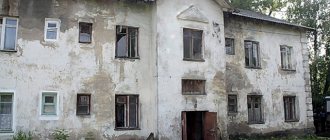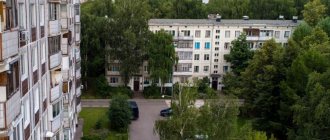Section I. General provisions
Chapter 1. Basic provisions. Housing legislation
- Article 1 - Basic principles of housing legislation
- Article 2 – Providing conditions for the exercise of the right to housing
- Article 3 - Inviolability of home and inadmissibility of its arbitrary deprivation
- Article 4 - Housing relations. Participants in housing relations
- Article 5 - Housing legislation
- Article 6 - Effect of housing legislation over time
- Article 7 - Application of housing legislation by analogy
- Article 8 - Application of other legislation to housing relations
- Article 9 - Housing legislation and international law
- Article 10 - Grounds for the emergence of housing rights and obligations
- Article 11 - Protection of housing rights
- Article 12 - Powers of state authorities of the Russian Federation in the field of housing relations
- Article 13 - Powers of state authorities of a constituent entity of the Russian Federation in the field of housing relations
- Article 14 - Powers of local government bodies in the field of housing relations
Chapter 2. Objects of housing rights. Housing stock
- Article 15 - Objects of housing rights
- Article 16 - Types of residential premises
- Article 17 - Purpose of residential premises and limits of its use. Use of residential premises
- Article 18 - State registration of rights to residential premises
- Article 19 - Housing stock
- Article 20 - State housing supervision, municipal housing control and public housing control
- Article 21 - Insurance of residential premises
Chapter 3. Transfer of residential premises to non-residential premises and non-residential premises to residential premises
- Article 22 - Conditions for transferring residential premises to non-residential premises and non-residential premises to residential premises
- Article 23 - Procedure for transferring residential premises into non-residential premises and non-residential premises into residential premises
- Article 24 - Refusal to transfer residential premises to non-residential premises or non-residential premises to residential premises
Chapter 4. Redevelopment and redevelopment of residential premises
- Article 25 - Types of reconstruction and redevelopment of residential premises
- Article 26 - Grounds for reconstruction and (or) redevelopment of residential premises
- Article 27 - Refusal to approve the reconstruction and (or) redevelopment of residential premises
- Article 28 - Completion of reconstruction and (or) redevelopment of residential premises
- Article 29 - Consequences of unauthorized reconstruction and (or) unauthorized redevelopment of residential premises
General rules for eviction from residential premises
It should be noted that eviction from an apartment is a forced measure and is an exception to the rules of inviolability of the home, which are proclaimed by the Constitution of the Russian Federation, but there is no contradiction here. Eviction is used only in cases that are provided for by law and are in the interests of society. The purpose of an eviction is usually to vacate the property. Secondary goals are considered to be the need to:
- avoid an accident (as in the case of emergency housing);
- restore social justice (when housing is seized without permission);
- restore the violation of the rights of third parties (as in the case of systematic violation of the legal rights of neighbors);
- replenish the revenue side of the budget (option - eviction from residential premises for systematic and prolonged non-payment of utilities).
According to the norms of housing legislation, citizens are evicted from residential apartments with the provision of other premises of similar comfort and area, according to certain conditions:
- the house where the residential property was located is being demolished;
- residential premises must be converted to non-residential premises;
- the apartment is declared unfit for habitation;
- after major repairs or other reconstruction of the house, it is impossible to keep the apartment or its total area decreases, as a result of which the tenant and his family living there need housing, or vice versa, it increases, significantly exceeding the norms of square meters for each family member (Article 85 of the Housing Code of the Russian Federation) .
If the tenant does not recognize the eviction and does not want to vacate the living space, then the relevant authorities must go to court to demand the forced eviction of the violator. The court decision should include an obligation to provide the evicted citizen with similar comfortable housing.
In case of legal eviction, the previous social tenancy agreement is terminated and a new agreement is concluded for the provided premises.
The procedure for eviction of citizens has its own characteristics:
- eviction can be carried out exclusively from a residential premises or one that has lost this status;
- eviction is carried out in the interests of the state, the evicted person (in emergency situations) or a third party with the right to this housing, which the evicte and his family occupied illegally. No other cases are provided for by law;
- eviction is carried out against the will of the citizen living there and his family;
- the person evicted to this housing did not previously have any rights and lived in it illegally or for certain reasons (by law) lost such a right
- eviction is carried out solely on the basis of a court decision.
Section II. Ownership and other proprietary rights to residential premises
Chapter 5. Rights and obligations of the owner of residential premises and other citizens living in the premises belonging to him
- Article 30 - Rights and obligations of the owner of residential premises
- Article 31 - Rights and obligations of citizens living together with the owner in residential premises belonging to him
- Article 32 - Ensuring the housing rights of the owner of a residential premises when withdrawing a land plot for state or municipal needs
- Article 33 - Use of residential premises provided by testamentary refusal
- Article 34 - Use of residential premises on the basis of a lifelong maintenance agreement with dependents
- Article 35 - Eviction of a citizen whose right to use residential premises has been terminated or who violates the rules for using residential premises
Chapter 6. Common property of premises owners in an apartment building. General meeting of such owners
- Article 36 – Right of ownership to common property of owners of premises in an apartment building
- Article 36.1 - General funds held in a special account
- Article 37 - Determination of shares in the right of common ownership of common property in an apartment building
- Article 38 - Acquisition of a share in the right of common ownership of common property in an apartment building when purchasing premises in such a building
- Article 39 - Maintenance of common property in an apartment building
- Article 40 - Changing the boundaries of premises in an apartment building
- Article 41 – Right of ownership to the common property of the owners of rooms in a communal apartment
- Article 42 - Determination of shares in the right of common ownership of common property in a communal apartment
- Article 43 - Maintenance of common property in a communal apartment
- Article 44 - General meeting of owners of premises in an apartment building
- Article 45 - Procedure for holding a general meeting of owners of premises in an apartment building
- Article 46 - Decisions of the general meeting of owners of premises in an apartment building
- Article 47 - General meeting of owners of premises in an apartment building in the form of absentee voting
- Article 47.1 - General meeting of owners of premises in an apartment building in the form of absentee voting using the system
- Article 48 - Voting at a general meeting of owners of premises in an apartment building
Eviction without provision of other accommodation
In 2020, the procedure for judicial eviction without provision of living space occurs as follows:
- The owner (tenant) notifies tenants of forced eviction.
- The employer is given a specific period to eliminate violations.
- If he does not correct them, the owner has the right to file a lawsuit (a sample of this can be viewed in court).
Before making a decision, the court notifies residents of the consequences. If the tenants still do not act, the court forcibly evicts them.
From the municipal
Citizens who live in a municipal apartment under a social tenancy agreement are obliged to:
- monitor the order and serviceability of communications;
- carry out repair work on time;
- keep silence;
- pay utilities.
Failure to fulfill obligations serves as grounds for forcible eviction from a residential premises.
From my own
If a living space has been purchased or taken into ownership, then eviction from it cannot be carried out by law. But if there are certain circumstances, this can be done.
Eviction is possible if the owner of the property:
- does not use it for its intended purpose;
- does not keep the apartment in good condition;
- does not respect the interests of neighbors.
The basis for eviction is also a court decision.
A sample statement of claim for eviction from an apartment can be used when drawing up a document. How to evict tenants from a communal apartment? See here.
Illegally residing
Unauthorized residence in a residential premises - living in it illegally.
These are:
- lack of documentation confirming the right to use this premises - deed of transfer, privatization agreement, deed of gift, etc.;
- lack of a certificate of registration of property rights.
Despite the fact that the apartment is occupied without permission, it will be possible to evict from it only through the court.
Residents also have the right to be held criminally liable if they cause damage to their housing. The Housing Code does not have an article regulating the eviction of citizens illegally living in a residential area.
In case of divorce
Having dissolved a marriage, the owner of the property has the right to evict the former spouse without providing other housing, in the following cases:
- the living space is the property of one spouse;
- the former spouse has been living at a different address for more than 3 years;
- he is the owner of another home in which he is registered;
- The spouses signed a marriage contract, which states the division of property.
It will be more difficult if the housing was purchased with common money during marriage, or if the spouses have children.
In this case, there are several solutions - sell the home and divide the money equally, the spouse is paid his share.
For debts
The law states that the owner of the property is obliged to regularly pay for utilities. If they do not pay for more than six months, then the court has the right to evict the tenants.
When tenants evict, they are required to be provided with premises to live under a social tenancy agreement.
Other grounds
If, as a result of the actions of the tenants, the housing was destroyed or damaged, then the violators can be evicted through the court.
Also grounds for eviction are:
- subletting of living space;
- the impossibility of living in the same apartment for parents deprived of their rights and their children.
You can evict for these reasons after a judge's decision.
Section III. Residential premises provided under social rental agreements
Chapter 7. Grounds and procedure for providing residential premises under a social tenancy agreement
- Article 49 – Provision of residential premises under a social tenancy agreement
- Article 50 - Norm for provision and accounting norm for the area of residential premises
- Article 51 - Grounds for recognizing citizens as needing residential premises provided under social tenancy agreements
- Article 52 - Registration of citizens as those in need of residential premises
- Article 53 - Consequences of citizens deliberately worsening their living conditions
- Article 54 - Refusal to register citizens as those in need of residential premises
- Article 55 - Reservation of the right of citizens to be registered as those in need of residential premises
- Article 56 - Removal of citizens from registration as those in need of residential premises
- Article 57 - Provision of residential premises under social tenancy agreements to citizens registered as needing residential premises
- Article 58 - Taking into account the legitimate interests of citizens when providing residential premises under social tenancy agreements
- Article 59 – Provision of vacated residential premises in a communal apartment
Chapter 8. Social rental of residential premises
- Article 60 - Social rental agreement for residential premises
- Article 61 – Use of residential premises under a social tenancy agreement
- Article 62 - Subject of the social rental agreement
- Article 63 - Form of a social tenancy agreement for residential premises
- Article 64 - Preservation of a social tenancy agreement for residential premises during the transfer of ownership of residential premises, the right of economic management or the right of operational management of residential premises
- Article 65 - Rights and obligations of the landlord of residential premises under a social tenancy agreement
- Article 66 - Responsibility of the landlord of residential premises under a social tenancy agreement
- Article 67 – Rights and obligations of a residential tenant under a social tenancy agreement
- Article 68 - Responsibility of the tenant of residential premises under a social tenancy agreement
- Article 69 - Rights and obligations of family members of a residential tenant under a social tenancy agreement
- Article 70 - The right of the tenant to move other citizens into the residential premises he occupies under a social tenancy agreement as members of his family
- Article 71 - Rights and obligations of temporarily absent tenants of residential premises under a social tenancy agreement and members of his family
- Article 72 - The right to exchange residential premises provided under social tenancy agreements
- Article 73 - Conditions under which the exchange of residential premises between tenants of these premises under social tenancy agreements is not allowed
- Article 74 - Registration of the exchange of residential premises between tenants of these premises under social tenancy agreements
- Article 75 – Invalidation of the exchange of residential premises provided under social tenancy agreements
- Article 76 – Subletting of residential premises provided under a social tenancy agreement
- Article 77 - Sublease agreement for residential premises provided under a social tenancy agreement
- Article 78 - Payment for subletting of residential premises provided under a social tenancy agreement
- Article 79 - Termination and termination of a sublease agreement for residential premises provided under a social tenancy agreement
- Article 80 - Temporary residents
- Article 81 - The right of the tenant of residential premises under a social tenancy agreement to provide him with residential premises of a smaller size in exchange for the occupied residential premises
- Article 82 - Amendments to the social tenancy agreement for residential premises
- Article 83 – Termination and termination of a social tenancy agreement
- Article 84 - Eviction of citizens from residential premises provided under social tenancy agreements
- Article 85 - Eviction of citizens from residential premises with the provision of other comfortable residential premises under social tenancy agreements
- Article 86 - Procedure for the provision of residential premises under a social tenancy agreement in connection with the demolition of a house
- Article 87 - Procedure for providing residential premises under a social tenancy agreement in connection with the transfer of residential premises to non-residential premises or declaring them unsuitable for habitation
- Article 87.1 - Procedure for the provision of residential premises under a social tenancy agreement in connection with the transfer of residential premises to a religious organization
- Article 88 - Procedure for providing residential premises in connection with major repairs or reconstruction of a house
- Article 89 – Providing citizens with other comfortable residential premises under a social tenancy agreement in connection with eviction
- Article 90 - Eviction of the tenant and members of his family living with him from residential premises with the provision of another residential premises under a social tenancy agreement
- Article 91 - Eviction of the tenant and (or) members of his family living with him from residential premises without the provision of other residential premises
Eviction from residential premises without provision of housing for debts
For all services provided to residents of apartments and houses by utility services, regular payments must be made. This situation can be traced at the legislative level.
When payments are made irregularly and in violation, various measures may be taken against the owners, including going to court.
Owners or tenants of housing who have arrears in paying utility bills may be forcibly evicted from the apartment. In this case, the debt can accumulate over six months. At the same time, the tenant has no compelling reasons for accumulating debts.
If tenants of an apartment are evicted under a social tenancy agreement, they are required to be provided with equivalent housing in place of the previous one. The standard area per person cannot be less than 6 square meters. m. per person.
The owner can apply to the court for an order to pay the debt at any time within three years.
Section IV. Specialized housing stock
Chapter 9. Residential premises of specialized housing stock
- Article 92 - Types of residential premises of specialized housing stock
- Article 93 – Purpose of service residential premises
- Article 94 - Purpose of residential premises in dormitories
- Article 95 - Purpose of residential premises of the mobile stock
- Article 96 - Purpose of residential premises in houses of the social service system
- Article 97 - Designation of residential premises of funds for temporary settlement of internally displaced persons and persons recognized as refugees
- Article 98 - Designation of residential premises for social protection of certain categories of citizens
- Article 98.1 - Designation of residential premises for orphans and children without parental care, persons from among orphans and children without parental care
Chapter 10. Provision of specialized residential premises and their use
- Article 99 – Grounds for the provision of specialized residential premises
- Article 100 – Lease agreement for specialized residential premises
- Article 101 – Termination of a rental agreement for specialized residential premises
- Article 102 – Termination of a rental agreement for specialized residential premises
- Article 103 - Eviction of citizens from specialized residential premises
- Article 104 – Provision of official residential premises
- Article 105 – Provision of residential premises in dormitories
- Article 106 – Provision of residential premises of a flexible stock
- Article 107 - Provision of residential premises in houses of the social service system for the population
- Article 108 – Provision of residential premises to funds for temporary settlement of internally displaced persons and persons recognized as refugees
- Article 109 - Provision of residential premises for social protection of certain categories of citizens
- Article 109.1 - Providing residential premises to orphans and children without parental care, persons from among orphans and children without parental care
Grounds for going to court
If the resident refuses to vacate the premises, the landlord may terminate the tenancy agreement by filing a lawsuit to protect his rights.
On the eviction of minor children from residential premises, see the article: eviction of minor children from residential premises.
If the tenant believes that his rights have been violated by the actions of the landlord, he can also go to court to protect his housing rights. The legal basis for this proceeding is similar to the option of going to court for the landlord.
The tenant must refer to the rules of law of the current housing legislation of the Russian Federation, as well as the rules of law related specifically to it.
Video: termination of a rental agreement for specialized residential premises
(No Ratings Yet)
Section V. Housing and housing construction cooperatives
Chapter 11. Organization and activities of housing and housing-construction cooperatives
- Article 110 – Housing and housing-construction cooperatives
- Article 111 – Right to join housing cooperatives
- Article 112 – Organization of a housing cooperative
- Article 113 - Charter of a housing cooperative
- Article 114 - State registration of a housing cooperative
- Article 115 – Management bodies of a housing cooperative
- Article 116 – Management in a housing cooperative
- Article 116.1 - Requirements for officials of a housing cooperative
- Article 117 – General meeting of members of a housing cooperative
- Article 118 – Board of a housing cooperative
- Article 119 – Chairman of the board of a housing cooperative
- Article 120 – Audit commission (auditor) of a housing cooperative
- Article 121 – Admission to membership in a housing cooperative
- Article 122 – Reorganization of a housing cooperative
- Article 123 – Liquidation of a housing cooperative
Chapter 12. Legal status of members of housing cooperatives
- Article 124 – Provision of living quarters in housing cooperative houses
- Article 125 – Right to a share of a member of a housing cooperative
- Article 126 – Temporary residents in residential premises in a housing cooperative building
- Article 127 – Division of living space in a housing cooperative building
- Article 128 – Renting residential premises in a housing cooperative building
- Article 129 - Ownership of residential premises in an apartment building of a member of a housing cooperative
- Article 130 – Termination of membership in a housing cooperative
- Article 131 – Preemptive right to become a member of a housing cooperative in case of inheritance of a share
- Article 132 - Return of the share contribution to a member of a housing cooperative expelled from the housing cooperative
- Article 133 – Eviction of a former member of a housing cooperative
- Article 134 - Providing members of a housing cooperative with living quarters in connection with the demolition of a house
Situations when housing can be taken away
There are various cases stipulated by law when residential real estate can be seized. Moreover, you can take away an apartment from both the owner and the tenants of municipal real estate, or tenants under a commercial lease agreement.
It is more difficult to deprive housing if you have ownership rights to it. This is possible only in one case - if it is possible to impose a penalty on the living space to reimburse the debts of the property owner. So, if the debtor owns not one, but several apartments, one of them can be forced to sell and pay off debts to all creditors.
It is important that it is impossible to take away the only living space if it is owned, even if there are large debts on utility bills.
It is somewhat easier to evict tenants or tenants from an apartment, and, moreover, situations are possible when no other apartment will be provided to a person.
Deprivation of living space as a punishment for irresponsible tenants
According to the Housing Code, when citizens live in municipal apartments rented out for social rent, eviction without the provision of other residential premises is possible if there are the following grounds:
- Residents (tenant or his close relatives) use it for other purposes. In accordance with the law, only permanent residence of citizens is allowed in premises considered residential. The only exception to this rule is the practice of notaries and lawyers. All other actions of residents, including the placement of industrial production in residential buildings, are unacceptable by law.
- Someone living in an apartment violates the rights and interests of other residents and neighbors. For forced eviction in this case, it is necessary to prove the systematic nature of such a violation.
- The tenant neglects his living space and allows the destruction of municipal housing with this attitude.
In such circumstances, the local authority responsible for municipally owned premises is obliged to issue an order to eliminate such violations.
If after this the residents continue to lead an irresponsible lifestyle, the municipality has the right to file a claim in court to deprive them of their rights to housing.
Moving out of the service apartment
In addition to deprivation of the right to reside in municipal housing, eviction from official residential premises is possible. In this case, no other living space is provided either.
You can evict from a service apartment:
- the employer himself upon dismissal and in the presence of circumstances provided for in the contract for the rental of official real estate;
- upon divorce, they can evict the employer's ex-spouse or other close relatives.
In general, the process of moving out of official housing is most often established in the rental agreement. It spells out the time frame within which tenants must move out, the consequences of refusing to leave the apartment, and many other issues of both obtaining the right of residence and its termination.
An important point in the deprivation of the right to reside in office premises is that forced eviction from it is also possible only by court decision.
As with official housing, people are evicted from premises that are not intended for permanent residence (dormitories). Such situations may arise at the end of a business trip, or if the room was provided in a similar way to official housing.
How to evict parents who are deprived of their rights
The Housing Code provides for the possibility of eviction from an apartment of parents who have been deprived of parental rights. This is possible if the court determines that it is impossible for children to live together with their deprived parents.
However, this is possible in two cases:
- If the housing belongs to the municipality and is used by citizens under a social rental agreement. Then representatives of the local administration file a claim for eviction in court.
- If an apartment or house is owned by a child whose parents have been deprived of their rights to it. In such a situation, the guardianship and trusteeship authorities, or representatives of the child left without parents, must evict the former relatives.
If the property belongs to the parents, it is impossible to deprive them of the right to reside in the residential premises.
Eviction from unauthorized occupied living space
There are other cases where a court order for eviction is necessary. Such situations include all options for illegally occupying real estate:
- refusal to move out of an apartment obtained under a commercial rental agreement;
- refusal to leave the premises after divorce;
- if you do not want to move out if there is a change in the owner of the residential premises (upon inheritance or sale of an apartment).
If there are tenants who do not want to move out of the living space, the owner of the unauthorized occupied living space may exercise the right of forced eviction by court decision.
Section VI. Homeowners Association
Chapter 13. Creation and activities of a homeowners association
- Article 135 - Homeowners' Association
- Article 136 – Creation and state registration of a homeowners’ association
- Article 137 - Rights of the homeowners association
- Article 138 - Obligations of the homeowners association
- Article 139 - Repealed
- Article 140 – Reorganization of a homeowners’ association
- Article 141 – Liquidation of a homeowners’ association
- Article 142 – Association of homeowners’ associations
Chapter 14. Legal status of members of the homeowners association
- Article 143 – Membership in a homeowners’ association
- Article 143.1 - Rights of members of the homeowners association and non-members of the homeowners association in an apartment building
- Article 144 – Management bodies of the homeowners’ association
- Article 145 - General meeting of members of the homeowners association
- Article 146 - Procedure for organizing and holding a general meeting of members of the homeowners association
- Article 147 – Board of the homeowners association
- Article 148 - Responsibilities of the board of a homeowners association
- Article 149 – Chairman of the board of a homeowners association
- Article 150 – Audit commission (auditor) of a homeowners’ association
- Article 151 - Funds and property of the homeowners association
- Article 152 – Economic activity of a homeowners’ association
Section VII. Payment for housing and utilities
- Article 153 - Obligation to pay for residential premises and utilities
- Article 154 – Structure of payments for residential premises and utilities
- Article 155 – Payment for residential premises and utilities
- Article 156 - Amount of payment for residential premises
- Article 156.1 - Payment for the rental of residential premises under a rental agreement for residential premises of a social housing stock
- Article 157 - Amount of payment for utility services
- Article 157.1 - Limitation on the increase in the amount of fees paid by citizens for utility services
- Article 158 - Expenses of owners of premises in an apartment building
- Article 159 - Providing subsidies for the payment of housing and utilities
- Article 160 – Compensation for expenses for living quarters and utilities
The procedure for eviction of citizens from specialized residential premises
Only the Civil Code should influence the forced eviction of “stubborn” citizens.
After forced expulsion from a residential area, citizens must be offered another living space that meets their living standards. For example, employers are required to provide conditions for citizens with disabilities: ramps and other amenities for comfortable movement.
That is, the order of this action is approximately as follows:
- An agreement on temporary stay in the residential area given to them is agreed upon with a certain circle of persons;
- The contract term reaches the termination date and is subject to termination;
- Citizens are politely asked to vacate the premises;
- If they agree, they are given other specialized housing;
- Otherwise, a statement is written against him and a lawsuit is filed.
What are the grounds for eviction of orphans from specialized residential premises?
“Kicking out” persons under the age of majority from specialized residential apartments is strictly prohibited if they are orphans, do not have guardians, or are dependents of the owner of the property. Also, those children who do not have their own living quarters are not subject to eviction from residential areas.
As you know, all citizens under the age of majority are protected by law. Therefore, it is impossible to evict them or “offend” them in any other way.
If the course of events did lead to the child being “kicked out” from a residential apartment, this procedure requires the following things: a certificate of housing; extract from the recreation center (house book); documents proving the relationship of those being evicted; a copy of the child’s birth certificate and, in fact, the grounds for eviction from the residential area.
Section VIII. Management of apartment buildings
- Article 161 – Choice of method of managing an apartment building. General requirements for the management of an apartment building
- Article 161.1 - Council of an apartment building
- Article 162 – Management agreement for an apartment building
- Article 163 - Management of an apartment building in state or municipal ownership
- Article 164 - Direct management of an apartment building by the owners of premises in such a building
- Article 165 – Creation of conditions for the management of apartment buildings
Changes to the Housing Code from 2020: eviction from residential premises, rental housing, etc.
, a new edition of the Housing Code of the Republic of Belarus comes into force , which will introduce significant changes to housing legislation. Let's look at some of them below.
Firstly, new terms will appear in the Housing Code, in particular the definition of “rental housing”; other concepts will also be adjusted, for example, utilities, the total area of living space.
Secondly, the provisions on the privatization of residential premises and sublease agreements are excluded from the Housing Code. This was done due to the expiration of the deadline established for citizens to apply for privatization, which expired on July 1, 2020.
In addition, the list of grounds for the emergence of the right to own and use residential premises has been expanded . Thus, with the entry into force of the new edition of the Housing Code, the right to own and use residential premises can be obtained on the basis of a leasing agreement, the subject of which is an apartment or a residential building.
The procedure for calculating fees for some utility services is also changing. In particular, fees for services for the maintenance of elevators, sanitary maintenance of auxiliary premises of a residential building, for electricity for lighting of auxiliary premises and operation of equipment (except for elevators) will be charged based on the total area of residential premises owned by citizens , and not based on the number of citizens registered in a residential area.
The procedure for registering citizens in need of improved living quarters will change. For example, when registering in Minsk or in the Minsk region, residential premises located in Minsk and the Minsk region will be taken into account in the ownership and (or) possession and use of the citizen and his family members living with him.
Innovations will also appear in the procedure for eviction from residential premises. In particular, the new edition provides for cases when family members of the owner of privatized housing can be evicted, including former ones who lived with him at the time of privatization, but did not take part in it, as well as family members of the owner of housing built or purchased with government support. For example, it will be possible, at the request of the owner, to evict such family members, including former ones, to another residential premises that belongs to former family members or the owner by right of ownership in a given locality and complies with the sanitary and technical standards established for living.
The changes will also affect other norms of housing legislation. You can familiarize yourself with the normative act by following the link
Section IX. Organization of major repairs of common property in apartment buildings
Chapter 15. General provisions on major repairs of common property in apartment buildings and the procedure for its financing
- Article 166 - Major repairs of common property in an apartment building
- Article 167 - Ensuring timely capital repairs of common property in apartment buildings
- Article 168 - Regional program for capital repairs of common property in apartment buildings
- Article 169 – Contributions for major repairs of common property in an apartment building
- Article 170 – Capital repair fund and methods of forming this fund
- Article 171 - Peculiarities of paying contributions for major repairs
- Article 172 - Control over the formation of the capital repair fund
- Article 173 - Change in the method of forming the capital repair fund
- Article 174 - Use of funds from the capital repair fund
Chapter 16. Formation of a capital repair fund in a special account
- Article 175 - Special account
- Article 176 - Peculiarities of opening and closing a special account
- Article 177 – Transactions on a special account
Chapter 17. Formation of capital repair funds by a regional operator. Activities of a regional operator in financing capital repairs of common property in apartment buildings
- Article 178 - Legal status of the regional operator
- Article 179 – Property of the regional operator
- Article 180 - Functions of the regional operator
- Article 181 - Formation of capital repair funds on the account of a regional operator
- Article 182 - Responsibilities of the regional operator for organizing major repairs of common property in apartment buildings
- Article 183 - Accounting for capital repair funds by a regional operator
- Article 184 – Return of funds from the capital repair fund
- Article 185 - Basic requirements for the financial sustainability of the activities of a regional operator
- Article 186 - Control over the activities of the regional operator
- Article 187 – Reporting and audit of the regional operator
- Article 188 - Responsibility of the regional operator
Chapter 18. Carrying out major repairs of common property in an apartment building
- Article 189 - Decision to carry out major repairs of common property in an apartment building
- Article 190 - Financing expenses for major repairs of common property in an apartment building
- Article 191 - Measures of state support, municipal support for capital repairs
Section X. Licensing of activities for the management of apartment buildings
Chapter 19. Licensing of activities for the management of apartment buildings
- Article 192 - Licensing of activities for the management of apartment buildings
- Article 193 - Licensing requirements
- Article 194 - Procedure for making a decision on granting a license or refusing to grant a license
- Article 195 - Registers of information containing information on licensing activities for the management of apartment buildings
- Article 196 - Procedure for organizing and implementing licensing control
- Article 197 - The procedure for informing local government bodies, owners of premises in an apartment building and other interested parties about decisions made by the licensing commission and the state housing supervision body
- Article 198 - The procedure for the licensee to post information about apartment buildings, the management of which is carried out by the licensee. Grounds and procedure for entering information about an apartment building into the register of licenses of a constituent entity of the Russian Federation, excluding information about an apartment building from the said register
- Article 199 – Cancellation of a license and termination of its validity
- Article 200 - Termination of activities related to the management of apartment buildings due to the exclusion of information about the apartment building from the register of licenses of a constituent entity of the Russian Federation, termination of the license or its cancellation
- Article 201 – Licensing Commission
- Article 202 – Qualification certificate
Article 84 of the Housing Code of the Russian Federation
To Contents
Article 84. Eviction of citizens from residential premises provided under social tenancy agreements Eviction of citizens from residential premises provided under social tenancy agreements is carried out in court: 1) with the provision of other comfortable residential premises under social tenancy agreements; 2) with the provision of other residential premises under social tenancy agreements; 3) without providing other residential premises.
Article 84. Eviction of citizens from residential premises provided under social tenancy agreements Commentary on Article 84 1. Eviction of citizens from residential premises is permitted only on grounds specifically named in federal law. In this case, we are talking specifically about federal law, and not about other regulations. This principle applies to any eviction, regardless of whether it is related to the termination of the rental agreement, i.e. whether it concerns all permanent users of the premises, whether the evicted persons are included in the rental agreement. This rule applies to the eviction of persons occupying residential premises, both legally and illegally. Eviction for reasons other than those specifically named in the law is not permitted. The Plenum of the Supreme Court of the Russian Federation (clause 35 of the Resolution No. 14 of July 2, 2009) indicated that “the courts must keep in mind that the termination of a social tenancy agreement for residential premises and the eviction of citizens from it at the request of the landlord or state authorities and local authorities self-government, as follows from the provisions of Part 4 of Article 3 of the Housing Code of the Russian Federation, are possible only on the grounds and procedure established in the Housing Code of the Russian Federation (Articles 29, 83, 85 - 91 of the Housing Code of the Russian Federation).” Eviction from residential premises is carried out under different conditions. Firstly, the tenant and his family members can be evicted with the provision of other comfortable living quarters. In this case, the requirements for residential premises must meet the established requirements. Secondly, the tenant and members of his family can be evicted and provided with other housing. In this case, residential premises must be provided within the boundaries of the given locality, but it may not be comfortable. When evicting citizens under these conditions, the provision of inadequate housing is the right, and not the obligation, of the person carrying out the eviction. The tenant does not have the right to demand that he and his family members be provided with comfortable living quarters. Thirdly, the tenant and members of his family may be evicted without providing other housing. On the issue of the constitutionality of eviction without the provision of other residential premises, the Constitutional Court of the Russian Federation proceeds from the fact that the Constitution of the Russian Federation (Article 40) prohibits only arbitrary eviction. Since eviction based on law and judicial procedure cannot be considered arbitrary, it cannot be considered as violating the constitutional right to housing. 2. For the requirements that other comfortable or other residential premises must satisfy, see the commentary to Art. 15 Housing Code of the Russian Federation.










